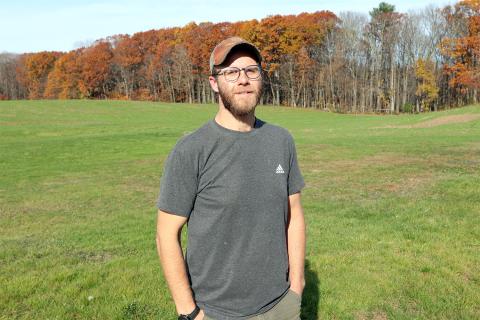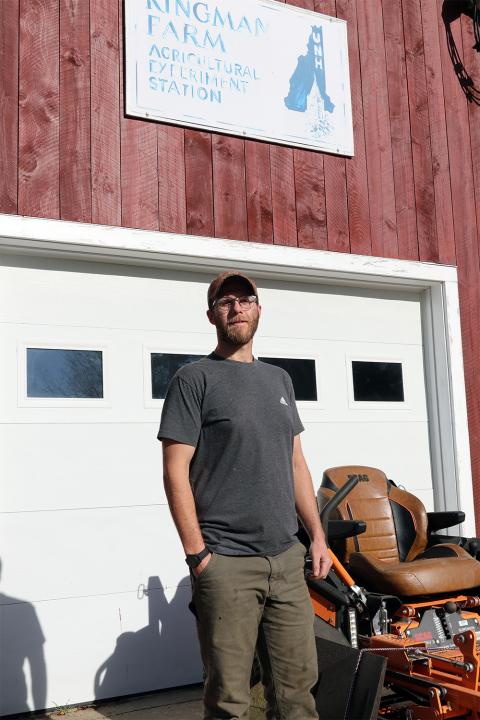
Mark Trabold, assistant farm manager of UNH's Woodman Horticultural Research and Kingman Research farms, returned to work at UNH in July 2022. A 2015 graduate of the Bachelor’s degree in Animal Science: Dairy Management program, Mark assisted–and still occasionally does–Nancy Whitehouse with her dairy research while an undergraduate and lived and worked at the Fairchild Dairy Teaching and Research Center. In 2016, he joined UNH as a lead farm worker and worked his way up to assistant manager of Fairchild Dairy. After taking a brief hiatus from full-time farm work, Mark decided there was only one place he’d much rather be.
Now he’s back at UNH and the New Hampshire Agricultural Research Station in a new role, but still fulfilling his passion of working with plants and animals.
I took a break to see if there are other things I enjoyed doing outside of agriculture and quickly learned agriculture is exactly where I belong.

Position: Assistant Farm Manager, Woodman Horticultural Research and Kingman Research farms
Years with NHAES: Current role since 2022
Previous positions: Worked first as the lead farm worker, and later the assistant manager, at the Fairchild Dairy Teaching and Research Center from 2016-2021.
Mark Trabold: I’ve always grown a vegetable garden. I didn’t really grow up around a farm per se. My sister and I had to convince my family to allow us to garden. We didn’t have a farm growing up, but we got into livestock and 4-H, so we started building a small family farm with cows, pigs, chickens and goats—pretty much everything but horses at some point.
In 4-H, we showed sheep, llamas and beef cattle. Llamas are great guard animals–we couldn’t take the llamas to a fair without the sheep freaking out, so we just made sure that they’re behaved enough around folks and showed them at fairs.
Mark: They’re kinda dog-like. They have strong personalities. All livestock really have personalities, but llamas are really strong-willed animals, you can tell. We’d go on hikes with them, have them carry gear when out in the mountains or something.
Mark: I don’t belong indoors. I love being outdoors as much as I can be, and I’m drawn to nature in every aspect and that overlaps in agriculture. When I left UNH to work briefly in manufacturing, I was working indoors, in a windowless building, with no real attachment to the outside. I said, “No, this is no for me. I need to be back working with the soil and earth—back to working with plants and animals again.”
I have a real passion for working with livestock too, and someday I’d like to run my own dairy farm.
Learn more
Mark: I’m a graduate of UNH and I feel it’s a really welcoming community. The transition from Fairchild, it was really neat to see the research and see it applied in a way that can help other producers. And having an opportunity to be back at the Ag Experiment Station in a different role and new facility is excellent. I love interacting with the students and seeing their desire to learn as well, and I’m in a great position to share knowledge with and teach students too!